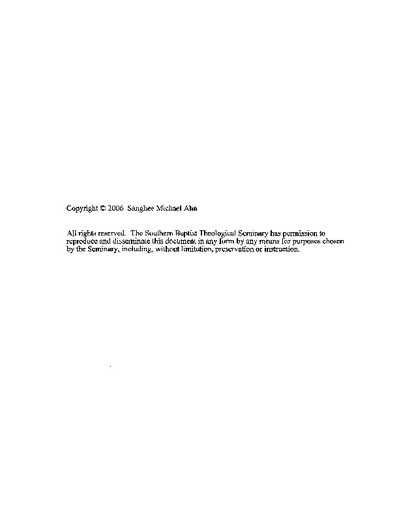| dc.contributor.advisor | Polhill, John B. | |
| dc.contributor.author | Ahn, Sanghee Michael | |
| dc.date.accessioned | 2010-01-04T15:43:52Z | |
| dc.date.available | 2010-01-04T15:43:52Z | |
| dc.date.created | 2006-11-01 | |
| dc.date.issued | 2006-11-01 | |
| dc.identifier.other | THESES Ph.D .Ah61o | |
| dc.identifier.uri | http://hdl.handle.net/10392/411 | |
| dc.description.abstract | This dissertation examines the Christological witness function of the Old Testament characters in the Gospel of John. Chapter 1 discusses the problem concomitant to the bi-partite nature of the Christian Bible and the scholarly solutions suggested to remedy this issue. The importance of Christology for John and the Gospel's indebtedness to the Jewish heritage is also noted. Combining these two aspects, some scholarly attempts to account for Johannine Christology in terms of Jewish hero redivivus theories are reviewed. An important consensus has emerged from German scholarship that sees the role of the Old Testament as Christological witness. This perspective gave impetus to the present research concerning the same witness function of the Old Testament characters. The rest of chapter 1 discusses the preliminary questions, such as, the justification, contributions, methodology, terms, and limits of the present study.
Chapter 2 investigates the contribution of Jacob and Abraham to Johannine Christological understanding in view of relevant intertestamental Jewish literature. In contrast to some scholarly arguments, the main function of these patriarchs is to undergird the messianic identity of Jesus.
Chapter 3 concerns Elijah in early Judaism and John. The eschatological expectation of Elijah in the former period is marked by his militant subjugation of the gentiles along with the reconciliation ministry. The contextual reading of the passages related to Elijah in John reveals that he is a type of John the Baptist rather than Jesus.
Chapter 4 examines David, probably the most influential messianic prefiguration of the intertestamental period. He is characterized by his competence as a ruler, his loyalty to Judaism, and his status as an eschatological figure. While the first half of John's Gospel does not portray Jesus as a Davidic figure, the latter half is replete with the references to the Davidic trials. Although one can argue for a correspondence between David and Jesus in the Johannine passion accounts, the analogy is more evident between Yahweh and Jesus, let alone the suffering aspect of David, which did not constitute the messianic expectations of early Judaism.
Chapter 5 engages in a study of Moses as depicted in early Judaism and John. In contrast to the perspectives of the Hebrew scriptural traditions, in which Moses is understood as the prophet par excellence, the fourth evangelist presents him merely as a Christological witness, not as a messianic prefiguration.
Chapter 6 summarizes the foregoing observations and offers hermeneutical implications for the study of the Gospel of John, especially with reference to the redactional capability of the fourth evangelist and the value of the intertestamental Jewish literature. | en_US |
| dc.language.iso | en_US | en_US |
| dc.subject | Bible.--N.T.--John--Criticism, interpretation, etc. | en_US |
| dc.subject | Bible.--N.T.--John--Relation to the Old Testament | en_US |
| dc.subject | Bible.--O.T.--Quotations in the New Testament | en_US |
| dc.subject | Jesus Christ--Messiahship | en_US |
| dc.subject | Jacob (Biblical patriarch) in the New Testament | en_US |
| dc.subject | Abraham (Biblical patriarch) in the New Testament | en_US |
| dc.subject | Moses (Biblical leader) in the New Testament | en_US |
| dc.subject | Elijah (Biblical prophet) in the New Testament | en_US |
| dc.subject | David, King of Israel in the New Testament | en_US |
| dc.title | Old Testament characters as Christological witnesses in the Fourth Gospel | en_US |
| dc.type | Thesis | en_US |
| dc.publisher.institution | Southern Baptist Theological Seminary | en_US |

